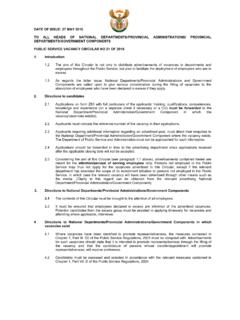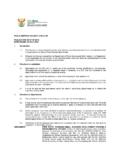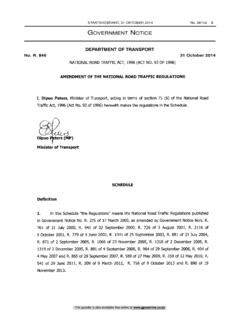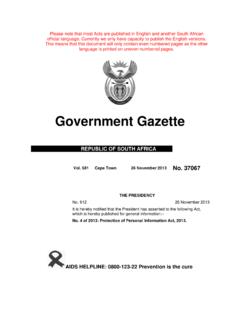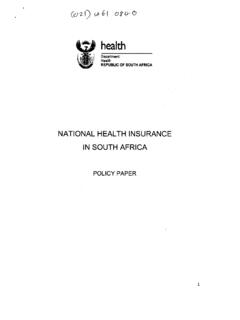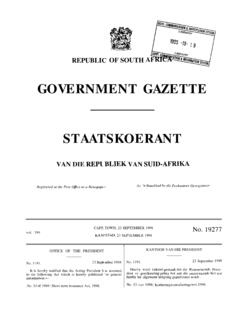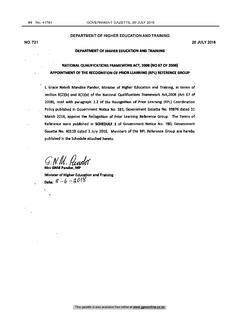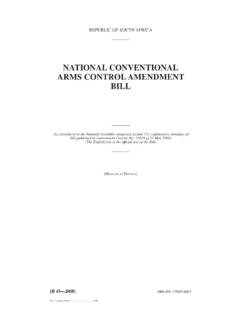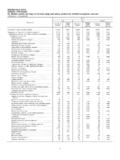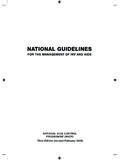Transcription of GOVERNMENT GAZETTE STAATSKOERANT
1 GOVERNMENT GAZETTESTAATSKOERANTVAN DIE REPUBLIEK VAN SUID-AFRIKARt xl !11 1 ( (1 (II III( f)(~vl ()[fl( ( (/\ (1 v( )t Y/l(l/)< l.\\ /1 !v/1/(\lJ/(1(/ ll\ (//( l (l\/T(/lll(J(J/ (;(Jr[>y/\/11>,, TOLL N. 5 .IL NE 19 ) \.-\ PSADAD. 5 J[ Nlt 1 ) )SNo. 18964 . IOFFICE OF THE PRESIDENTIMNT130R VAN DIE PRESIDENTIN(), 7s ).5 June 199X Y(). 7X9~ Junic IC){)8 GENERAL EXPLANATORY NOTE:[]Words in bold type in square brackets indicate omissions fromexisting underlined with a solid line indicate insertions inexisting provide for the prohibition of unlawful eviction; to provide for procedures forthe eviction of unlawful occupiers; and to repeal the Prevention of Illegal SquattingAct, 1951, and other obsolete laws; and to provide for matters incidental one may be deprived of property except in terms of law of generalapplication, and no law may permit arbitrary deprivation of property;AND WHEREASno one may be evicted from their home, or have their homedemolished without an order of court made after considering all the relevantcircumstances.)))))))))))))]]]}
2 AND WHEREASit is desirable that the law should regulate the eviction of unlawfuloccupiers from land in a fair manner, while recognising the right of land owners to applyto a court for an eviction order in appropriate circumstances;AND WHEREAS special consideration should be given to the rights of the elderly,children, disabled persons and particularly households headed by women, and that itshould be recognised that the needs of those groups should be considered;BE IT THEREFORE ENACTED by the Parliament of the Republic of South Africa,as follows: this Act, unless the context indicates otherwise (i) building or structure includes any hut, shack, tent or similar structure or anyother form of temporary or permanent dwelling or shelter; (ii)(ii) consent means the express or tacit consent, whether in writing or otherwise,of the owner or person in charge to the occupation by the occupier of the landin question; (x)(iii) court means any division of the High Court or the magistrate s court inwhose area of jurisdiction the land in question is situated; (iv)510(iv) evict means to deprive a person of occupation of a building or structure, orthe land on which such building or structure is erected, against his or her will,and eviction has a corresponding meaning; (xi)(v) land includes a portion of land; (iii)(vi) Minister means the Minister designated by the State President; (v)(vii) municipality means a municipality in terms of section 10B of the LocalGovernment Transition Act, 1993 (Act No.)
3 209 of 1993); (vi)(viii) organ of state means an organ of state as defined in section 239 of theConstitution of the Republic of SouthAfrica, 1996 (Act No. 108 of 1996); (ix)(ix) owner means the registered owner of land, including an organ of state; (i)(x) person in charge means a person who has or at the relevant time had legalauthority to give permission to a person to enter or reside upon the land inquestion; (viii)(xi) unlawful occupier means a person who occupies land without the expressor tacit consent of the owner or person in charge, or without any other right inlaw to occupy such land, excluding a person who is an occupier in terms of theExtension of Security of Tenure Act, 1997, and excluding a person whoseinformal right to land, but for the provisions of thisAct, would be protected bythe provisions of the Interim Protection of Informal Land Rights Act, 1996(Act No.
4 31 of 1996). (vii)Application of Act applies in respect of all land throughout the of receipt or solicitation of consideration in respect of unlawfuloccupation of land3.(1) No person may directly or indirectly receive or solicit payment of any moneyor other consideration as a fee or charge for arranging or organising or permitting aperson to occupy land without the consent of the owner or person in charge of that land.(2) Any person who contravenes a provision of subsection (1) is guilty of an offenceand liable on conviction to a fine or to imprisonment not exceeding two years, or to bothsuch fine and such imprisonment.(3) The court which convicts any person of a contravention of this section, must orderany money or other consideration received by that person which have been seized, to beforfeited, and the said money and the proceeds of such other consideration may be paidto the person or persons from whom the money or other consideration was received, andwhere such person or persons cannot be positively identified, into the National RevenueFund.
5 (4) If any money has been received in contravention of subsection (1) but has not beenseized or made available for purposes of confiscation, the court which convicts anyperson of a contravention of this section, may order the amount proved to thesatisfaction of the court to have been received by such person to be paid to the person orpersons from whom the money or other consideration was received, and where suchperson or persons cannot be positively identified, into the National Revenue Fund, andsuch order has the effect of and may be executed against such person as if it were a civiljudgment in favour of that person or persons from whom the money or otherconsideration was received or in favour of the of unlawful occupiers4.(1) Notwithstanding anything to the contrary contained in any law or the commonlaw, the provisions of this section apply to proceedings by an owner or person in chargeof land for the eviction of an unlawful occupier.
6 (2) At least 14 days before the hearing of the proceedings contemplated in subsection(1), the court must serve written and effective notice of the proceedings on the unlawfuloccupier and the municipality having (3) Subject to the provisions of subsection (2), the procedure for the serving of noticesand filing of papers is as prescribed by the rules of the court in question.(4) Subject to the provisions of subsection (2), if a court is satisfied that service cannotconveniently or expeditiously be effected in the manner provided in the rules of thecourt, service must be effected in the manner directed by the court: Provided that thecourt must consider the rights of the unlawful occupier to receive adequate notice and todefend the case.(5) The notice of proceedings contemplated in subsection (2) must (a)state that proceedings are being instituted in terms of subsection (1) for anorder for the eviction of the unlawful occupier;(b)indicate on what date and at what time the court will hear the proceedings;(c)set out the grounds for the proposed eviction; and(d)state that the unlawful occupier is entitled to appear before the court anddefend the case and, where necessary, has the right to apply for legal aid.
7 (6) If an unlawful occupier has occupied the land in question for less than six monthsat the time when the proceedings are initiated, a court may grant an order for eviction ifit is of the opinion that it is just and equitable to do so, after considering all the relevantcircumstances, including the rights and needs of the elderly, children, disabled personsand households headed by women.(7) If an unlawful occupier has occupied the land in question for more than six monthsat the time when the proceedings are initiated, a court may grant an order for eviction ifit is of the opinion that it is just and equitable to do so, after considering all the relevantcircumstances, including, except where the land is sold in a sale of execution pursuantto a mortgage, whether land has been made available or can reasonably be madeavailable by a municipality or other organ of state or another land owner for therelocation of the unlawful occupier, and including the rights and needs of the elderly,children, disabled persons and households headed by women.
8 (8) If the court is satisfied that all the requirements of this section have been compliedwith and that no valid defence has been raised by the unlawful occupier, it must grant anorder for the eviction of the unlawful occupier, and determine (a)a just and equitable date on which the unlawful occupier must vacate the landunder the circumstances; and(b)the date on which an eviction order may be carried out if the unlawfuloccupier has not vacated the land on the date contemplated in paragraph(a).(9) In determining a just and equitable date contemplated in subsection (8), the courtmust have regard to all relevant factors, including the period the unlawful occupier andhis or her family have resided on the land in question.(10) The court which orders the eviction of any person in terms of this section maymake an order for the demolition and removal of the buildings or structures that wereoccupied by such person on the land in question.
9 (11)Acourt may, at the request of the sheriff, authorise any person to assist the sheriffto carry out an order for eviction, demolition or removal subject to conditionsdetermined by the court: Provided that the sheriff must at all times be present duringsuch eviction, demolition or removal.(12) Any order for the eviction of an unlawful occupier or for the demolition orremoval of buildings or structures in terms of this section is subject to the conditionsdeemed reasonable by the court, and the court may, on good cause shown, vary anycondition for an eviction proceedings for eviction5.(1) Notwithstanding the provisions of section 4, the owner or person in charge ofland may institute urgent proceedings for the eviction of an unlawful occupier of thatland pending the outcome of proceedings for a final order, and the court may grant suchan order if it is satisfied that (a)there is a real and imminent danger of substantial injury or damage to anyperson or property if the unlawful occupier is not forthwith evicted from theland;6510152025303540455055(b)the likely hardship to the owner or any other affected person if an order foreviction is not granted, exceeds the likely hardship to the unlawful occupieragainst whom the order is sought, if an order for eviction is granted; and(c)there is no other effective remedy available.
10 (2) Before the hearing of the proceedings contemplated in subsection (1), the courtmust give written and effective notice of the intention of the owner or person in chargeto obtain an order for eviction of the unlawful occupier to the unlawful occupier and themunicipality in whose area of jurisdiction the land is situated.(3) The notice of proceedings contemplated in subsection (2) must (a)state that proceedings will be instituted in terms of subsection (1) for an orderfor the eviction of the unlawful occupier;(b)indicate on what date and at what time the court will hear the proceedings;(c)set out the grounds for the proposed eviction; and(d)state that the unlawful occupier is entitled to appear before the court anddefend the case and, where necessary, has the right to apply for legal at instance of organ of state6.
